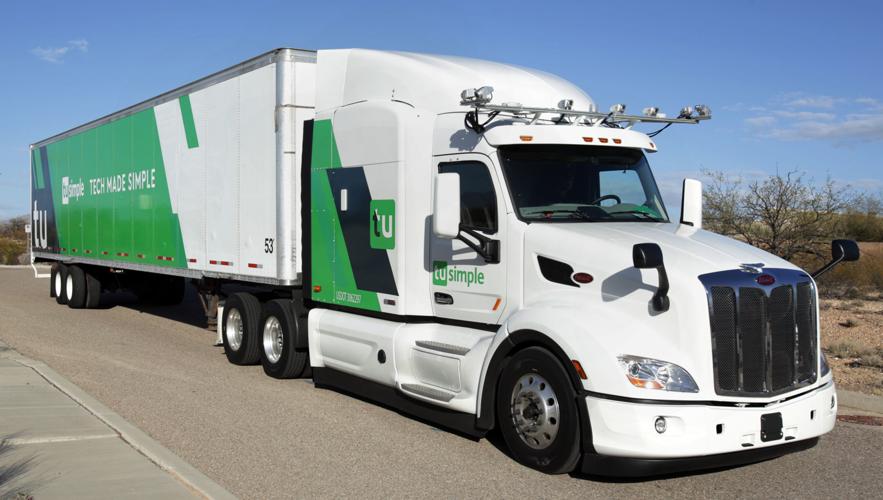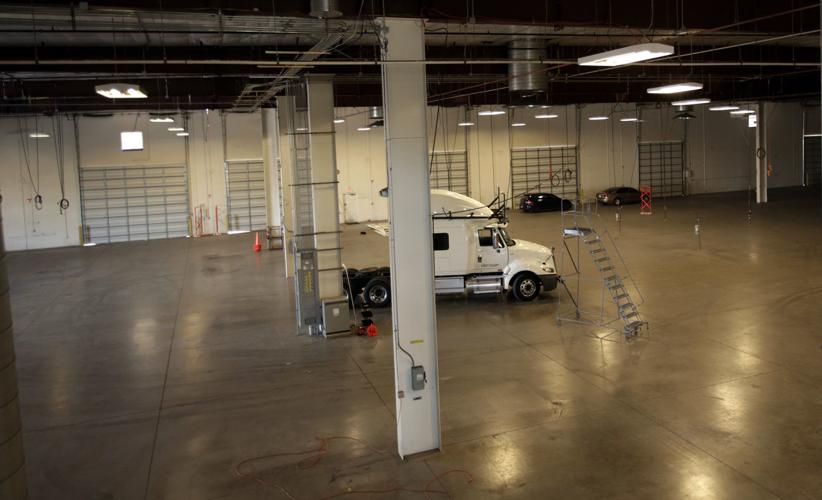Though it will likely be a decade or more before commercial trucks roll down the road without human drivers, trucks with sophisticated, semiautonomous driving systems will soon be on the street т with a person aboard to supervise.
TuSimple, a Chinese-based startup company that set up a research and test center in УлшжжБВЅ last year, is moving fast to make that happen.
The company has moved into larger quarters on УлшжжБВЅтs southeast side as it ramps up toward road tests of its semiautonomous trucks later this year.
After finding its initial site off West Grant Road and Interstate 10 too small for its purposes, the company moved to a new facility on Old Vail Road in early February, said Chuck Price, a TuSimple partner and vice president of product.
The property, consisting of a 50,000-square-foot industrial building on about eight acres, formerly was occupied by a maker of sheet-metal ductwork and features high bay areas the company needs for its growing fleet of test trucks.
People are also reading…
TuSimple, which has dual headquarters in Beijing and San Diego, plans to build out offices and labs at the new УлшжжБВЅ site and eventually hire about 90 employees here to focus on production development of its autonomous truck systems, Price said.
The company already has nearly 200 employees in all, including 60 at its research facility in San Diego and more than 100 in Beijing, Price said.
TuSimple has key partnerships with companies including graphics-card maker Nvidia, which makes programmable vehicle control boards, and Texas-based truckmaker Peterbilt Motors Co.
The company has raised more than $80 million in funding since 2015 from investors including Chinese internet giant Sina Weibo and Nvidia.
But TuSimple also has some significant competition in the emerging self-driving truck industry.
Truckmakers including Volvo and Daimler have been involved in semiautonomous truck research for years, with Daimler unveiling a self-driving Freightliner truck back in 2015.
Ride-sharing service Uber bought into a self-driving truck startup that delivered a load of beer across Colorado in 2016, and Google spinoff Waymo is working on autonomous trucks as it tests self-driving ride-sharing vans in the Phoenix area.
In November, Elon Muskтs Tesla unveiled an electric-powered truck with a semiautonomous autopilot system.
THE ROAD AHEAD
Despite all the development work, self-driving trucks still face significant technical, political and regulatory challenges.
Major industry groups such as the American Trucking Association have urged caution, citing safety concerns and the lack of interstate regulations.
The Teamsters Union vehemently opposes self-driving truck regulations, citing safety concerns and the potential loss of thousands of jobs, and the union has helped stymie pending autonomous-vehicle legislation in Congress.
TuSimpleтs Price acknowledged that it may be years before self-driving trucks are allowed to operate without human backup in all conditions т known as Level 5 autonomy.
But in the meantime, Price said TuSimple hopes new regulations will allow the company to offer Level 4 autonomous driving т allowing the use of self-driving trucks mainly on highway stretches т with a тdriver supervisorт present but not always in control.
Though that wonтt save trucking companies the cost of a driver, it could provide benefits in safety, logistics and fuel economy, said Price, who before joining TuSimple led engineering and technical operations for a California company developing systems to allow trucks to тplatoonт down the highway.
тWe think there will still be plenty of opportunities for drivers, and driving in conditions that are more healthy, that keep drivers home at night so theyтre not stuck out in the middle of nowhere, and ideally in cases where theyт re not driving at night,т he said.
тThe other aspect is, when you have a driver in the vehicle, you effectively have a much safer driving environment, because you have a system thatтs fully capable of handing the vehicle, doesnтt get sleepy, and you have a driver who has a partner at all times.т
TuSimple has already successfully conducted some long-distance testing, last July completing a 200-mile Level 4 test drive from San Diego to Yuma using an Nvidia graphics-processing unit and cameras as primary sensors.
Rather than sell its systems, TuSimple plans to offer semiautomated hauling services. The company is in talks with shippers to carry its first commercial load on the roughly 120-mile route from УлшжжБВЅ to Phoenix by late spring, Price said.
The company has three Peterbilt 579 semi-trucks with three more on the way, and plans a fleet of 25 trucks to eventually serve the region, he said.
To create its robo-trucks, TuSimple strips out the sleeper-cab beds from the trucks and installs computer servers connected to cameras and sensors on the outside of the rigs, with seating for two test engineers.
Unlike most other systems that rely heavily on Lidar т a form of radar using pulsed lasers т TuSimpleтs system mainly uses advanced camera technology to recognize roadways and obstacles. The company maps the routes its trucks will run using passenger cars fitted with Lidar, cameras and other sensors.
All that technology takes talent to develop, so TuSimple has been busy hiring electrical, mechanical, software and system engineers.
While many of its engineers have come from China or California, the company is looking to establish a strong relationship with the University of УлшжжБВЅ, Price said.
Last fall, the company hired UA engineering grad Xinyi Xu as an autonomous driving operation and test engineer. Xu received a masterтs degree in systems engineering in 2017.
Xu said he was happy to find the opportunity at TuSimple and stay in УлшжжБВЅ, where he completed a bachelorтs degree in industrial engineering at the UA in 2015.
Larry Head, acting dean of the UA College of Engineering and director of the UAтs Transportation Research Institute, said TuSimple has given presentations to students about the companyтs work and actively pursued some students.
TuSimpleтs presence on the cutting edge of autonomous vehicle research offers UA students compelling new opportunities in the field, he said.
тItтs something thatтs very exciting to the students, having access to an emerging technology area,т Head said. тIтm glad weтre in a good place to be part of it.т
Contact senior reporter David Wichner at dwichner@tucson.com or 573-4181. On Twitter: @dwichner. On Facebook:




















